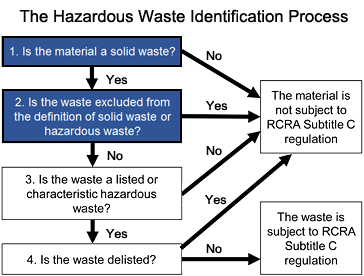The Definitive Guide to Reclaim Waste
The Definitive Guide to Reclaim Waste
Blog Article
Get This Report on Reclaim Waste
Table of ContentsThe Reclaim Waste Diaries10 Simple Techniques For Reclaim WasteOur Reclaim Waste PDFsThings about Reclaim WasteThe 10-Minute Rule for Reclaim Waste
Through appropriate liquid waste administration, firms can lower energy-intensive therapy procedures and disposal prices. By following a system for managing liquid waste, companies can avoid expensive fines and fines and stay clear of unfavorable attention.(https://zenwriting.net/reclaimwaste1/innovative-industrial-wastewater-treatment-solutions-by-reclaim-waste)Gather depictive examples from different factors within the waste stream to guarantee precision. Conduct regular testing to track any kind of adjustments in the composition. Preserve thorough documents of characterization for future reference and compliance functions. Fluid waste, particularly harmful ones, postures significant dangers throughout this action. Correct treatments reduce spills, leaks, and other mishaps that might damage the employees and the general public.

Sanitation (e.g., chlorination, ultraviolet light, ozonation) and nutrient elimination (e.g., denitrification and phosphorus removal) are suggested under rigid guidelines. Countless business went against a number of fluid waste disposal laws in recent years.
Reclaim Waste Can Be Fun For Anyone

Superficial containers contain liquid waste that is permitted to evaporate with all-natural procedures. This type of disposal is subject to stringent ecological policies due to possibly unsafe emissions.
The searchings for need to be documented, assessed, and stored not just for entry to regulatory authorities yet also for making enhancements in the future. Usage reputable devices, techniques, and software program solutions to ensure accurate and consistent data collection. Remain updated on appropriate ecological guidelines and industry standards. Share information with appropriate stakeholders (e.g., workers, regulative federal government firms, and neighboring communities) to maintain openness and accountability.
Regardless of the firm dimension or sector, there are many difficulties related to this task. Comprehending these can help them efficiently manage their operations and minimize their ecological influence. makes it tough to deal with and deal with liquid waste safely. Companies that can't invest in facilities ought to think about working together with the general public field for better options.
Reclaim Waste - The Facts
By carrying out detailed management systems that include therapy and recycling methods, routine monitoring, threat analyses, and adherence to neighborhood and government regulations, industrial centers can contribute to the security of groundwater products, ensuring their schedule for future generations (liquid waste removal). Allow's delve into the relevance of effective fluid waste management in the industrial market, concentrating on its implications for securing groundwater resources
The air pollution of groundwater resources because of inappropriate liquid waste monitoring in the industrial market has far-reaching repercussions for human wellness, agriculture, and the environment in its entirety. Some of the prospective influences brought on by such contamination consist of: Contaminated Drinking Water Supplies: As groundwater supplies a considerable part of our alcohol consumption water, air pollution from commercial tasks can bring about hazardous chemicals and bacteria entering our water systems, presenting wellness risks for humans.
Lowered Agricultural Productivity: Agriculture relies heavily on groundwater for watering; for that reason, polluted water can prevent plant returns, contaminate agricultural products, and influence food safety and security. Offered the value of protecting groundwater sources, it is critical for organizations to take a proactive stance in managing their liquid waste properly and preventing contamination.
Some Ideas on Reclaim Waste You Need To Know
Fluid waste can contaminate land and contaminate waters. Details about dealing with and keeping fluid waste, reacting to spills and reducing liquid waste is readily available in the following truth sheets and guidance:.
The duty of waste administration professionals in protecting this valuable resource can not be overstated. Contaminated water and infected effluent management: Guaranteeing that hazardous liquids are safely removed and treated prior to they can hurt our water sources.
Hence, incorporating sustainable fluid waste monitoring right into economic planning improves economic stability and shields the atmosphere, showing the worth of this method. In conclusion, adopting professional fluid waste management practices is critical for guaranteeing a sustainable future, protecting our atmosphere and safeguarding the wellness of future generations.
When it involves taking care of waste, adhering to appropriate treatments is vital for a multitude of reasons. Appropriate waste disposal is not nearly sanitation; it's regarding making sure the well-being of our setting, health and wellness, and the reliable use resources. Recognizing the relevance of reliable waste management can help all of us add to a much healthier, cleaner world.
Reclaim Waste Fundamentals Explained
Effective waste administration helps maintain clean streets and public Visit Website areas, minimizing the aesthetic influence of clutter and guaranteeing that waste does not harm wildlife. When waste is not disposed of properly, it can lead to pollution, where harmful substances can seep right into the soil, water systems, and the air, creating lasting ecological issues.
Report this page